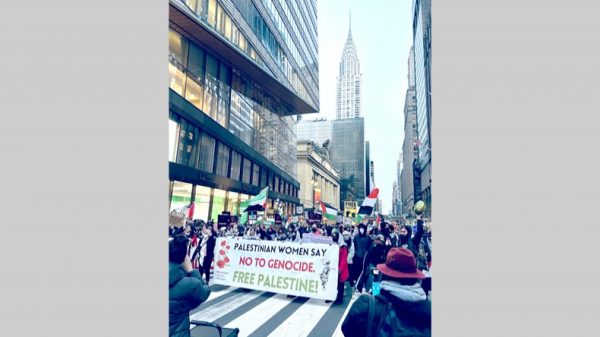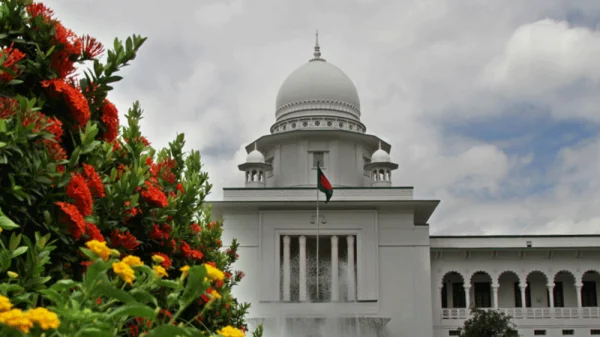Cunning of gender violence

Sarah Ihmoud:
THE testimonies emerging from Palestinians held captive by the Israeli military in Al-Shifa hospital, which was under persistent siege for 14 days, are harrowing: torture, starvation, executions, the mutilation and burning of bodies, and the destruction of life saving medical equipment. Today, we are asked to watch, over and over again, the mass violation of Palestinian bodies, including sexualised torture, to consume testimonies of Palestinian women being raped while in Israeli military custody, to digest the public displays of women’s lingerie in the bombarded streets and homes of our cities. How do we read and understand this violent spectacle, even as it is still unfolding?
War is always about a performance of hypermasculinity, as feminist scholars remind us, and sexual atrocity transforms women’s bodies into a method of communication between men. In our own history, gender and sexual politics have played a central role in Israel’s genocidal violence since its inception; rape was used as part of an attempt to terrify Palestinian communities into fleeing their ancestral homes and villages. Indeed, in 1948 it was our great grandmothers recounting their violation in Deir Yassin; today it is their granddaughters in Gaza. In war and military conflict, women’s bodies are always situated as symbolic national peripheries; in genocide, Indigenous women’s bodies and sexualities are targeted because of what they represent: land, Indigenous reproduction, sovereignty, and the possibility of Indigenous futures. While rape or sexual violence might be inflicted on the bodies of women, its broader purpose is often to humiliate and punish the collective to which they belong. The gendered logics of the militarised performance that is unfolding in Gaza today is precisely to force us, through mass violence and psychological terror, to recognise and accept our defeat.
And yet, the persistent efforts by Palestinian feminists to call attention to the pervasive gendered logics that animate Israeli settler colonialism have been met with little political interest by feminists in the West, making feminism “a silent bystander for many everyday forms of state criminality.” [1] Instead, we as Palestinian women and feminists are consistently asked to participate in our own pathologisation and criminalisation by colonial powers; to reproduce the culturalised narratives that contribute to the protracted violence directed at our communities, and to internalise our oppressors’ own fear. Today, these politics have played out in the demands that Palestinian feminists and our allies condemn sensationalised accounts of mass rape on October 7, to which, as of yet, no actual evidence exists. In the twisted logic of Zionist colonialism, a refusal to ‘admit’ that mass rape occurred on October 7 becomes a form of further incrimination, even as the Zionist state actively rapes and pillages our bodies and our lands.
There is perhaps no clearer example of this logic than the recent ‘suspension’ of Professor Nadera Shalhoub-Kevorkian, one of the preeminent Palestinian feminist scholars of our time, from the Hebrew University of Jerusalem. In a letter addressed to the social work community on March 20, Dean Asher Ben-Arieh wrote that: ‘The decision [to suspend Shalhoub-Kevorkian] is rooted in one key element — the denial of the rape and murder of civilians, women, and children on October 7… Those who deny cases of rape and murder cannot teach in the school of social work. Just like those who claim that same-sex relationships are a deviation that requires conversion therapy, or those who argue that beating women in a family is an acceptable way to put them in their place, cannot teach the profession of social work and rely on the faculty of a school for social work.’ Not only is this a gross mischaracterisation of Shalhoub-Kevorkian’s actual words, an attempt to discursively constrain the professor’s attention to the criminality of the Israeli state in a moment of intensified genocidal war, while marking her as a proponent of violence, colonial gaslighting of the first degree. It must also be understood as part of a growing wave of disciplinary action targeting Palestinian scholars within Israeli academia, a system already deeply complicit in the settler colonial project and its entwined violent suppression of Palestinian scholarship (indeed, the Hebrew University was founded before the 1948 Nakba, as a ‘comprehensive university and centre for the formation of a new collective Jewish-Zionist identity and nation’).
While Professor Shalhoub-Kevorkian’s case is the most visible today, there are others that fall under the radar. Just three weeks ago, colleagues and I received notice that a conference at Yale University we were scheduled to speak at, on ‘Pinkwashing and Feminism(s) in Palestine’, had been ‘indefinitely postponed’. We learned that the Yale Office of Student Affairs had opened an investigation into the Women’s Centre, the student-led organisation on campus organizing the conference, for ‘anti-Israel sentiment’, after a Zionist group on campus complained that the conference did not address the alleged sexual violence committed by Hamas on October 7. According to the organiser, who resigned from her position in protest, Yale’s administration threatened disciplinary action against all staffers at the Women’s Centre, even those that were not involved in planning the conference, if the conference went on as planned. The pressure placed on students to cancel the conference, denounced for its ‘exclusion of Jewish women’s voices and its libellous portrayal of Israel and Israelis’, underscores the intertwined logics of pinkwashing, the mobilisation of LGBTQ rights to obfuscate the ongoing settler colonisation of Palestine, and Israel’s war on Palestinian women, where the centring of a Zionist narrative, and in particular, that of the Jewish female subject threatened by a dangerous Arab masculinity, long-standing racial and Orientalist tropes that have enabled colonial violence, is elevated over that of Palestinian women and queers, who are today made distinctly vulnerable to Zionist violence and oppression.
The Hebrew University of Jerusalem announced it had reversed its dismissal of Nadera Shalhoub-Kevorkian on March 27, after a meeting in which, according to the administration, she ‘clarified’ that she was not dismissing the possibility that cases of rape occurred on October 7, and the Yale conference has been reorganised with the support of faculty and academic departments, in spite of Zionist and administrative attempts to shut it down, evidencing that the gendered logics of Zionist repression do not go unchallenged. Even as attacks on women and feminists are mounted, we keep pushing back and refuse to be silenced, and we must continue to do so. These small victories invite us to consider how we comprehend and analyse the complexities of the gendered logics of Zionist colonialism and its unfolding.
The feverish attempts (or perhaps more accurately, desires) of the Zionist movement to discipline, criminalise and terrorise Palestinian women and feminists, including our scholars, activists, and movement leaders, from naming and exposing the gender violence that sits at the very core of the colonial project, and which we are witnessing on a mass scale, must be recognised and named for what it is: a recycling and retrenchment of the very gendered logics of Israel’s genocidal politics in another form. As I have written previously, many of us have faced Israel’s violent attempts to silence our voices and, in doing so, discipline us into erasure, with punitive ramifications politically, professionally, and personally, when writing or speaking out about the injustices facing our people, including histories of gender and sexual violence that continue into the present. In fact, the gendered and sexualised backlash we face as Palestinian women and feminists when writing or speaking out about ongoing histories of gender and sexual violence highlights the fact that this backlash is in fact an extension of colonial politics; ‘indeed, the same rhetoric targeting Palestinian women’s bodies and sexualities are remade in a new context, evidencing the libidinal economy of Zionist colonialism. These gendered forms of violence not only endanger the lives and agency of Palestinian women and feminists, they also impede the critical debate, analysis, and heterogeneity within our own communities that are always necessary to grow and sustain liberatory movement-building.’
As feminists, we know that rape and sexual violence are endemic to armed conflict, and we condemn gender violence in our own communities as essential to our liberation as a people. We have been fighting for gendered liberation in our own communities as we fight against colonialism for decades, recognizing that colonial and patriarchal violence are, in fact, deeply intertwined. Still, we recognise the cruel irony that the very language and discourse of feminism is being used to justify our own elimination as a people by the very powers decrying gendered violence. We must, then, ask the question: What is Zionism performing when it simultaneously rapes and violates our women, mass murders our children and attempts to starve us to death while disciplining us for naming this as genocidal?
Those of us who have been doxed, targeted, and fired from our positions, know exactly what this is about. We who have received the Dean’s moralizing and recriminatory letters; we who have had our names and reputations smeared in Zionist newspapers and websites; we who have had our faces plastered next to the word ‘antisemite’ in public spaces. We who have received emails from the public calling us ‘terrorists’ who deserve to die; we who have been threatened with rape and violence against our families. (I will never forget the email I received from a man after being doxed by a Zionist organisation in Boston who wrote that he knew where I worked and thought that I should be cut up into pieces. The article that prompted this harassment, titled ‘Sexual violence, women’s bodies and Israeli settler colonialism’, was written alongside Dr Shalhoub-Kevorkian herself in the midst of Israel’s 2014 military assault on Gaza, and highlighted the very logics I draw attention to again today). We know that this is an attempt to break our spirits, to make us too afraid to continue speaking, writing, and acting defiantly as Palestinian women and feminists for our people’s freedom. We see this as a further attempt to demonise us as Palestinian women, to monsterise and pathologise our Palestinian men, to break apart our sacred kinships with each other and our homeland; to invade our intimacies, assault the senses and orchestrate affects of widespread fear, terror and defeat. To undermine the power and authority of our truths, to belittle the beauty of our voices, and to break the role that we must continue to take up in this liberation movement.
This disciplinary violence is precisely a key element of what Professor Shalhoub-Kevorkian calls the ‘cunning of gender violence.’ Ironically, the very rhetoric and recognition of gendered violence exercised by authority figures in the global governance community (Western nations and their allies), can too often hide or elide the gendered violence and criminality of powerful state actors, hiding it in plain sight. The repression of Nadera Shalhoub-Kevorkian, one of the most internationally renowned and distinguished Palestinian feminist scholar-activists of our time, whose trailblazing work has centred the experiences of Palestinian women with settler colonialism and military occupation for the better part of three decades, and who has widely condemned Israel’s genocidal policies today, is both a message and a test case. The zionist project’s instrumentalisation of rape claims to inflict more violence on Palestinian women and feminists speaking out against mass atrocity is meant to terrify and disempower us, to discipline us into silence and complicity, and to show us that, if they can do it to Nadera, they can do it to any of us at any time. These are precisely the abusive gendered tactics that are so central to weaponizing rape and sexual violence during intensified military conflict and the genocidal policies the Israeli state carries out in Gaza today.
When we allow colonial feminist discourses and practices to shore up genocidal violence, militarised warfare, and the violation of Indigenous lands, bodies, and lives, all of us stand to lose. If we are serious about ending sexual violence in genocide and armed conflict, then we must take seriously the well-documented claims of sexual violence against Palestinian women, men, and children that Palestinian women and feminists have been decrying since 1948. The ongoing Nakba must be stopped. Rejecting the violent reproduction of the cunning of gender violence is a feminist responsibility that allows us to name the gendered logics of settler colonial genocide while honoring the living, embodied memories of those who survive.
Jadaliyya.com, April 3. Sarah Ihmoud is a Chicana-Palestinian anthropologist who works to uplift the lived experiences, histories, and political contributions of Palestinian women and Palestinian feminism. She is a founding member of the Palestinian Feminist Collective, an executive board member of Insaniyyat, the Society of Palestinian Anthropologists, and is assistant professor of anthropology at the College of the Holy Cross in Worcester, MA.























Leave a Reply